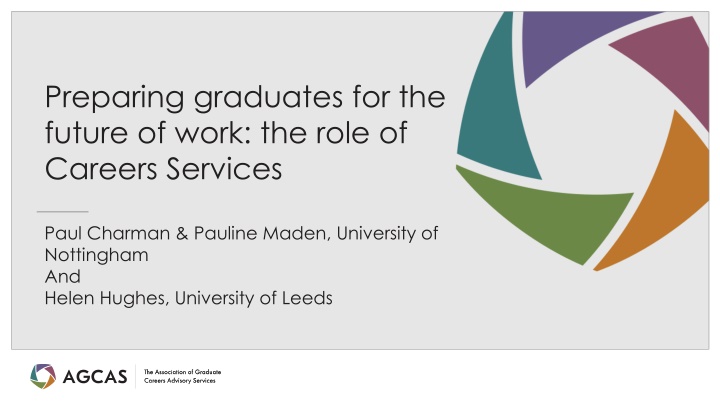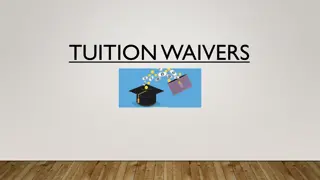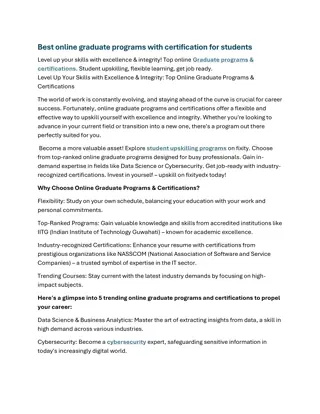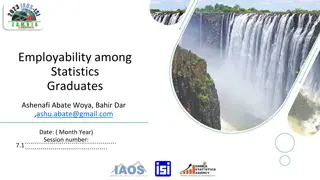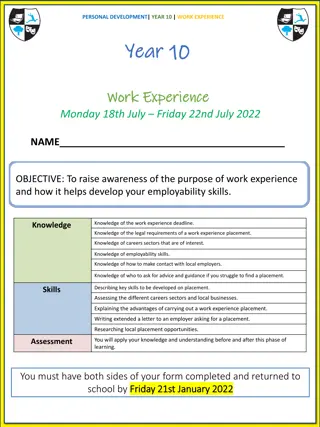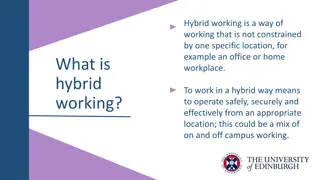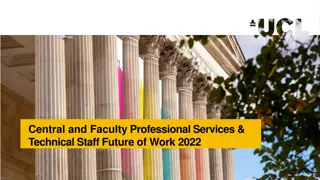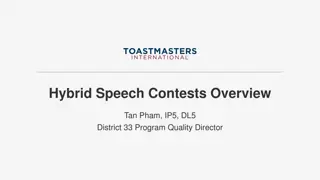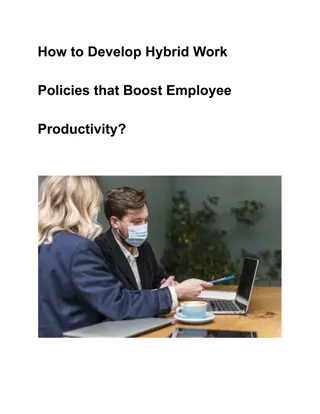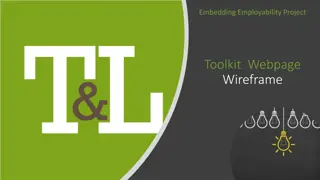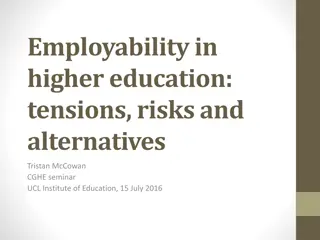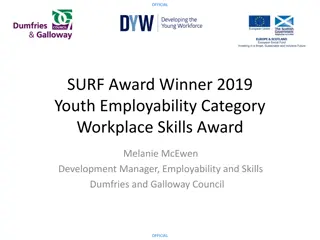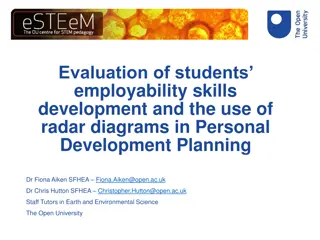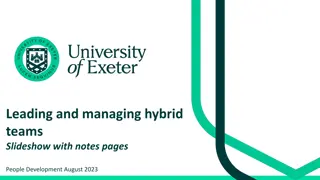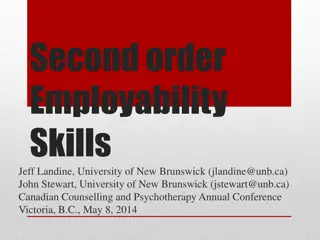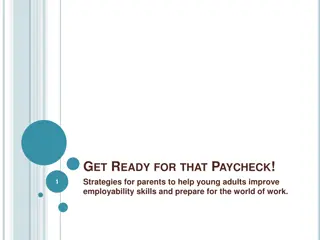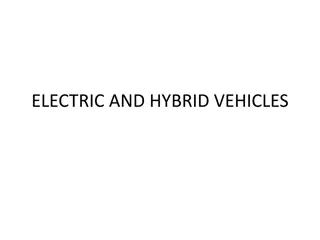Navigating Graduate Employability in the Era of Hybrid Work
In the evolving landscape of work dynamics, preparing graduates for the future entails integrating practical actions and fostering adaptability to hybrid work environments. Insights from research sessions and case studies highlight the importance of career services, job role fit, network mindset, buddy schemes, platform etiquette, workload management, and informal interactions. Addressing these aspects can enhance graduate employability and success in the modern workplace.
Download Presentation

Please find below an Image/Link to download the presentation.
The content on the website is provided AS IS for your information and personal use only. It may not be sold, licensed, or shared on other websites without obtaining consent from the author.If you encounter any issues during the download, it is possible that the publisher has removed the file from their server.
You are allowed to download the files provided on this website for personal or commercial use, subject to the condition that they are used lawfully. All files are the property of their respective owners.
The content on the website is provided AS IS for your information and personal use only. It may not be sold, licensed, or shared on other websites without obtaining consent from the author.
E N D
Presentation Transcript
Preparing graduates for the future of work: the role of Careers Services Paul Charman & Pauline Maden, University of Nottingham And Helen Hughes, University of Leeds
Todays session Research update Case study Discussion on practical actions to help ecosystem stakeholders facilitate graduate employability in an era of hybrid work
Hybrid Dashboard Hybrid Dashboard 72% Businesses expect staff to hybrid work 15% 93% 47% Time co-located during placement year 30% Want access to Want access to a third space a third space 0% 100% 15% 31% 47% Reported Reported offices adapted offices adapted for hybrid for hybrid Expect staff to spend >50% time in office Of communication is via 'scheduled video meetings' 18% 60% 31% Of communication is via 'quick online chats' Trained for Trained for hybrid activities hybrid activities 6% 0% 100% How do you want to work? Home Workspace 27% Lacked quiet workspace 23% Never want to return to office working 23% Wished to work only in the office 49% Sought a hybrid pattern 35% No dedicated workspace
PREPARING FOR THE FUTURE OF WORK JOB ROLE FIT 01 VISIBILITY 04 01 04 Help new starters learn how their job role fits within the wider business. Help them develop strategies and techniques to improve their workplace visibility, without being intrusive or overly demanding. NETWORK MINDSET 02 THE RIGHT QUESTIONS 05 02 05 Build structured ways to help new starters meet other people anchor days, hybrid work patterns, physical space. Help new starters develop the confidence to ask the right questions, at the right time, of the right people, when working remotely. BUDDY SCHEMES 03 UNCOMFORTABLE TOPICS 06 03 06 Consider providing early career employees with a more experienced buddy to help them navigate culture and norms. Help new starters develop techniques for approaching uncomfortable topics, particularly if working remotely.
PREPARING FOR THE FUTURE OF WORK PLATFORM ETIQUETTE 07 WORKLOAD 09 07 09 Show new colleagues how and when different types of remote working platforms are being used in your organization, and what the etiquette is. Prepare new starters for peaks and troughs in their workload by normalizing this, and helping them to develop strategies for seeking support when needed. It can be hard to benchmark workload when working remotely. INFORMAL INTERACTION 08 HYBRID PATTERN 10 08 10 Encourage new colleagues to see the value in informal, social interaction with colleagues, as well as purposeful communication about work projects. Do not assume that new starters need to be in the office all the time to be able to develop. Being in the office can help them learn from others, but only if colleagues are working the same hybrid pattern.
University of Nottingham Case Study 4/2/2024 Event Name and Venue 6
Managing Transition and Embracing Change Module This module aims at supporting students to embrace the transition from university to work and gain a better awareness of how the workplace operates. By looking at what change means to them, students will also identify opportunities in developing themselves and gain greater confidence when entering the workplace. As somebody who generally struggles with change, doing this module prepared me for what to expect when transitioning from University into working life Honestly, I would recommend this module to any final year student regardless of whether you re anxious about starting work or not as it provides great insight into the expectations of working life and offers ways to best prepare for the changes 7
Understanding and Developing Skills for the Hybrid Workplace: Workshops and Resources Workshops Resources Future Leaders Programme Skills workshops developing these skills: Workload Management How to build Professional Relationships How to do hybrid working effectively Meetings Etiquette Professional Emails 8
Career Wellbeing Career Wellbeing Module Resources This module aims to help look after your career wellbeing and overcome common career-related challenges when: Exploring career ideas and thinking about your future Applying for jobs and taking part in recruitment activities You are at work; either when you re at university and undertaking part-time work, internships, placements or volunteering, or when you re approaching the end of your course and thinking about moving into graduate employment 9
Citation: Hughes, H.P.N., & Thambar, N. (2023). Graduate Careers in a Changing Workplace: A Fresh Challenge? In W. Donald (ed.) Establishing and Maintaining Sustainable Career Ecosystems for University Students and Graduates. ICI Global, UK.
www.bitly.com/valueofworkplacements www.bitly.com/AdaptingOffices http://futureworkplace.leeds.ac.uk
Further reading Thambar, N., & Hughes, H.P.N. (2023). 'The Robots are Coming 2 Rise of the Screens : The role of higher education careers professions in disrupted times. Journal of the National Institute for Career Education and Counselling (NICEC), 50, 85-95. Available at: https://nicecjournal.co.uk/index.php/nc/article/view/432/420 Hughes, H.P.N., & Thambar, N. (2023). Graduate Careers in a Changing Workplace: A Fresh Challenge? In W. Donald (ed.) Establishing and Maintaining Sustainable Career Ecosystems for University Students and Graduates. ICI Global, UK. Donald, W.E., & Hughes, H.P.N. (2023). How academics can play a more influential role during a year-in-industry placement: A contemporary critique and call for action. Industry and Higher Education, https://doi.org/10.1177/09504222231162059. Davis, M.C., Collis, H., Hughes, H.P.N., Rees, S., Gritt, S., Wu, C., Fang, H (2022). Adapting offices for the future of work. Stage 2 Report. A report by the Adapting Offices for the Future of Work UKRI-funded research project. Available at: https://futureworkplace.leeds.ac.uk Hughes, H.P.N., & Davis, M.C. (2021). Starting your career during a pandemic. Leeds University Business School. Available at: https://futureworkplace.leeds.ac.uk Davis, M.C., Hughes, H.P.N., Rees, S., Gritt, S., Wu, C., Collis, H., Fang, H (2021). Adapting offices for the future of work. Stage 1 Report. A report by the Adapting Offices for the Future ofWork UKRI-funded research project. Available at: https://futureworkplace.leeds.ac.uk
Thank you! h.hughes@leeds.ac.uk paul.charman@nottingham.ac.uk pauline.maden@nottingham.ac.uk
